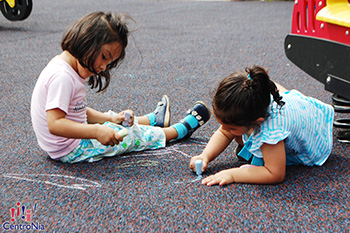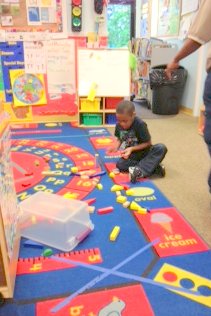 The grant is comprised of ten main large-scale projects:
The grant is comprised of ten main large-scale projects:
Project 1 – Local Early Childhood Councils
Created 24 local early childhood councils with the goal of developing local plans for implementation of Maryland’s RTT-ELC state plan. The Annie E. Casey Foundation provided leadership coordination to local councils over 12 months.
Project 2 – Maryland EXCELS
Enhanced and administered a full-scale implementation of the Tiered Quality Rating and Improvement System (Maryland EXCELS) through a qualified vendor. Supported all public, private and community early learning and development programs to participate in Maryland EXCELS. Evaluated the effectiveness of Maryland EXCELS particularly the relationship between quality ratings, children’s learning and school readiness.
Project 3 Quality Capacity Building
Established an Early Childhood Breakthrough Center to provide quality capacity building for programs participating in Maryland EXCELS and expanded models of excellence in school improvement to Title 1 schools.
- Established two Community Hubs to provide and coordinate existing services for families with children, birth to five years of age
- Established five Preschool for All sites in Title 1 attendance areas
- Established two Judy Center Satellite Sites at Title 1 schools in school improvement in Baltimore City and Prince George’s County and expand services from the existing Judy Center Partnership sites to other Title 1 schools
- Provided coaching and mentoring for programs serving children three to five years of age that have an Individualized Education Program (IEP) or an Individualized Family Service Program (IFSP) under the Extended Option provisions of IDEA
Project 4 - Promoting Use of Early Learning Standards
Revised the state’s existing early learning standards to align with Common Core Standards. Developed a Guide to Early Childhood Pedagogy to support the use of early learning standards and assessment. Implemented two field tests of the Preschool Science, Technology, Engineering and Math (STEM) program to 150 classrooms in Maryland EXCELS participating programs. Expanded the language program, VIOLETS, to 150 classrooms in Maryland EXCELS participating program
Project 5 – Professional Development Maryland Model for School Readiness
Conducted professional development to promote the use of the early learning standards by all early learning and development programs.
 Project 6 – Comprehensive Assessment System
Project 6 – Comprehensive Assessment System
Revised the existing formative assessments (36-72 months), developed new formative assessments (birth to 36 months), and revised the existing Kindergarten Entry Assessment (Maryland Model for School Readiness) to align with the state adopted Common Core Standards. Developed training modules and professional development for the administration of state-recommended developmental screening instruments. Developed a technology platform for assessment administration with linkage to a reporting database and online resources for early learning. This project is conducted in collaboration with the State of Ohio.
Project 7 – Child Development Innovations
Addressed the health and behavioral needs of children through a coherent set of early intervention and prevention programs.
- Field tested and reported on Best Beginnings Developmental Screening instrument for children ages birth to three, developed by the University of Maryland
- Introduced the use of four state-recommended, valid Developmental Screening Instruments for children birth to five years of age
- Conducted training of pediatricians through a qualified vendor on state recommended developmental screening instruments
- Built mental health capacity in pediatrics and family practice through Maryland Early Childhood Mental Health Consultation in Pediatric Care to include detection and intervention
- Developed and implemented an online data collection and analysis system for training participation and outcomes in The Social and Emotional Foundations for Early Learning (SEFEL) to interface with Maryland’s Longitudinal Data System/Early Childhood Data Warehouse
Project 8 – Family Engagement and Support
Created a Coalition for Family Engagement to develop a Maryland-specific Family, Parent, and Community Engagement Framework to implement strategies and training for all early learning and development programs and family engagement organizations.
- Created Family Advisory Councils in local libraries located in or near Title 1 attendance areas, including the establishment of Family Information Centers and resource kits for families of young children.
- Expanded Parent-Child Learning Parties to 25 percent of all early learning and development programs in Title 1 attendance areas to promote the development of school readiness skills of young children.
- Expanded the Reach Out and Read Project of the American Academy of Pediatrics to primary care physicians/pediatricians statewide. Distributed books and information to over 46,100 children and their families over the four years of the grant.
Project 9 – Workforce Competency and Leadership Development
- Aligned the Child Care Credentialing Program with the Workforce Knowledge and Competency Framework to identify specific coursework for each of the credentialing levels
- Initiated a Maryland Approved Alternative Preparation Program for Early Childhood Education (MAAPP-ECE) for working early educators with four-year degrees to obtain state teaching certification in early childhood education
- Developed an articulation agreement for pre-service courses between MSDE approved trainers and the state’s community colleges to establish new pathways of training and post-secondary education.
- Strengthened pathways for teacher education by improving access to and transfer out of the Associate of Arts Teaching (AAT) in early childhood
- Conducted Early Learning Leadership Academies for educators in public schools (Prek-2) and early childhood programs serving preschool-age children
Project 10 – Early Learning Data System
Enhanced the existing early childhood data system to link with the Maryland Longitudinal Data System.
- Expanded the Child Care Automated Tracking System (CCATS) portal with professional development services for early care and education providers including applications for grants, incentives, training approval and professional development plans.
- Activated a CCATS module to include Grant Funds Management and Provider Benefits in one web-based location and made data available for analysis in the Maryland Longitudinal Data System.
- Developed, piloted and implemented a statewide secure system for attendance reporting for child care programs; created an interface enabling providers to use data in the preparation of Child Care Subsidy invoices.

